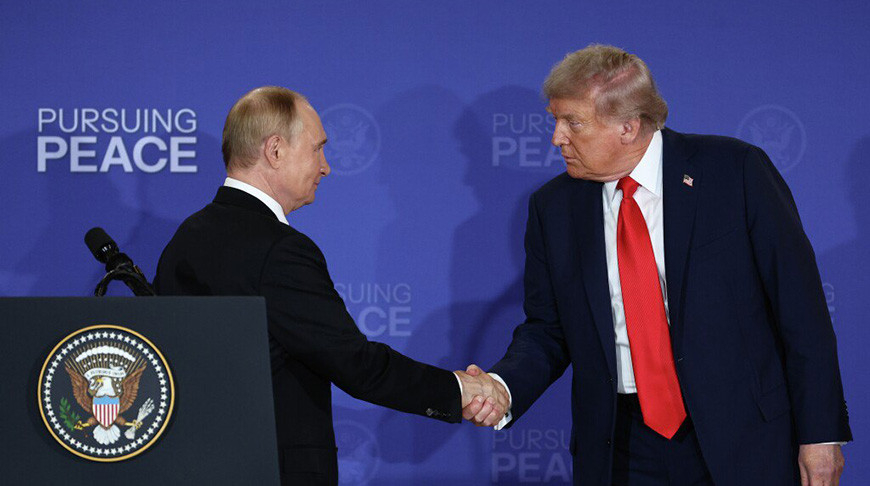Rumors swirl around Vladimir Putin’s alleged demand for complete control of Donbas during high-stakes talks with Donald Trump. The Russian leader reportedly sees this territorial concession as non-negotiable for peace, while Trump pressures Ukraine to consider compromises.
The Alaska summit failed to produce immediate agreements but revealed stark differences in approach between Washington and Kyiv. As Zelenskyy resists calls to cede territory, the geopolitical stakes continue rising, with Ukraine’s sovereignty hanging in the balance.
Western officials warn that accepting Russia’s demands could set dangerous precedents across Europe, even as Trump touts his negotiation strategy. The coming weeks may determine whether diplomacy or escalation shapes Ukraine’s future.
- Putin demanded full control of Ukraine’s Donbas region (including Donetsk and Luhansk) as a precondition for peace, seeking 20% more territory than currently occupied.
- Trump pressured Zelenskyy to negotiate concessions, arguing prolonged war risks greater losses while suggesting future reversibility of territorial compromises.
- Ukrainian officials warn any deal involving land concessions could trigger political upheaval, with 82% of Ukrainians opposing territorial surrenders regardless of circumstances.
Putin’s Donbas Demand: Did Trump Pressure Zelenskyy to Cede Territory for Peace?
The Geopolitical Chessboard: Understanding Putin’s Donbas Ultimatum
Vladimir Putin’s alleged demand for full control of Donbas represents a calculated escalation in Russia’s war strategy. According to multiple diplomatic sources, the Russian leader presented this as a non-negotiable precondition during his Alaska summit with Donald Trump. The demand encompasses not only currently occupied territories but extends to Ukrainian-held portions of Donetsk and Luhansk oblasts.
This territorial grab would secure Russia’s land bridge to Crimea while depriving Ukraine of critical industrial capacity and natural resources. Military analysts note the proposed borders would create defensible positions for Russian forces while leaving Ukraine strategically vulnerable to future incursions.
The timing of this demand appears deliberate, coinciding with:
- Western fatigue over sustained military aid to Ukraine
- Ongoing debates in Washington about Ukraine funding
- Seasonal advantages for Russian offensives in winter months

Trump’s Pressure Campaign: Realpolitik or Dangerous Precedent?


Donald Trump’s reported pressure on Volodymyr Zelenskyy to consider territorial concessions reveals fundamental tensions in Western approaches to the conflict. The former president has framed negotiations as pragmatic necessity, arguing:
- Prolonged conflict risks greater Ukrainian territorial losses
- Western support cannot continue indefinitely
- Demographic challenges undermine Ukraine’s long-term position
“It’s up to President Zelensky to get it done” – Trump’s words as quoted from summit discussions – reflects a transactional approach that alarms many European allies. This stance ignores Ukraine’s sovereignty while potentially rewarding Russian aggression.



The European Gap in Trump’s Strategy
Trump’s planned trilateral meeting excluding European partners creates significant diplomatic tension. Key concerns include:
| Country | Key Concerns | Preferred Approach |
|---|---|---|
| Germany | Energy security | Balanced negotiations |
| France | Strategic autonomy | European-led mediation |
| UK | Rules-based order | Military support continued |
Ukraine’s Impossible Choice: Territory vs Sovereignty
For President Zelenskyy, Putin’s Donbas demand presents an existential dilemma. Ukrainian political survival depends on maintaining several red lines:
- No recognition of Russian territorial claims
- No restrictions on future NATO membership
- No demilitarization requirements
The administration has floated potential compromises including temporary territorial arrangements tied to security guarantees. However, domestic opinion remains steadfast against concessions, with polls showing:
- 82% oppose territorial sacrifices regardless of circumstances
- 76% believe military victory remains possible
- 91% reject any form of Russian-administered territories



Military Reality Check: Can Ukraine Hold Donbas?


Current Battlefield Dynamics
Military analysts identify several critical factors shaping Donbas defense capabilities:
- Ukrainian artillery shortages due to delayed Western aid
- Russian adaptation to counter drone warfare advantages
- Degraded Russian combat effectiveness despite numerical superiority
Winter Campaign Risks
As temperatures drop, Russia possesses several asymmetric advantages:
- Greater tolerance for cold-weather operations
- Energy infrastructure targeting leverages civilian suffering
- Mud season limitations on maneuver warfare



Global Implications: How Donbas Could Reshape World Order
A Russian success in annexing Donbas would reverberate across multiple geopolitical theaters:
| Region | Potential Impact | Likely Responses |
|---|---|---|
| NATO Eastern Flank | Increased hybrid warfare threats | Permanent force deployments |
| Indo-Pacific | Chinese aggression precedents | Strengthened Taiwan assurances |
| Middle East | Russian influence expansion | Rewarded Israeli neutrality |
The Taiwan parallel looms particularly large, with Chinese officials carefully monitoring Western resolve. Any perception that territorial aggression yields dividends could accelerate timelines for action against Taiwan.



The Road Ahead: Scenarios From Best to Worst Case
Several potential outcomes emerge from current diplomatic and military trajectories:
- Ukrainian Counteroffensive Success: Regains territory through Western-equipped breakthroughs
- Frozen Conflict: Armistice lines solidify without political resolution
- Russian Collapse: Mounting casualties and sanctions trigger political instability
- NATO Direct Involvement: Article 5 triggered by spillover attacks
- Nuclear Escalation: Tactical weapons used to break deadlock
The most probable near-term outcome remains grinding attrition warfare, with neither side capable of decisive military victory. This reality makes negotiations inevitable – the key question remains on what terms.




Comments